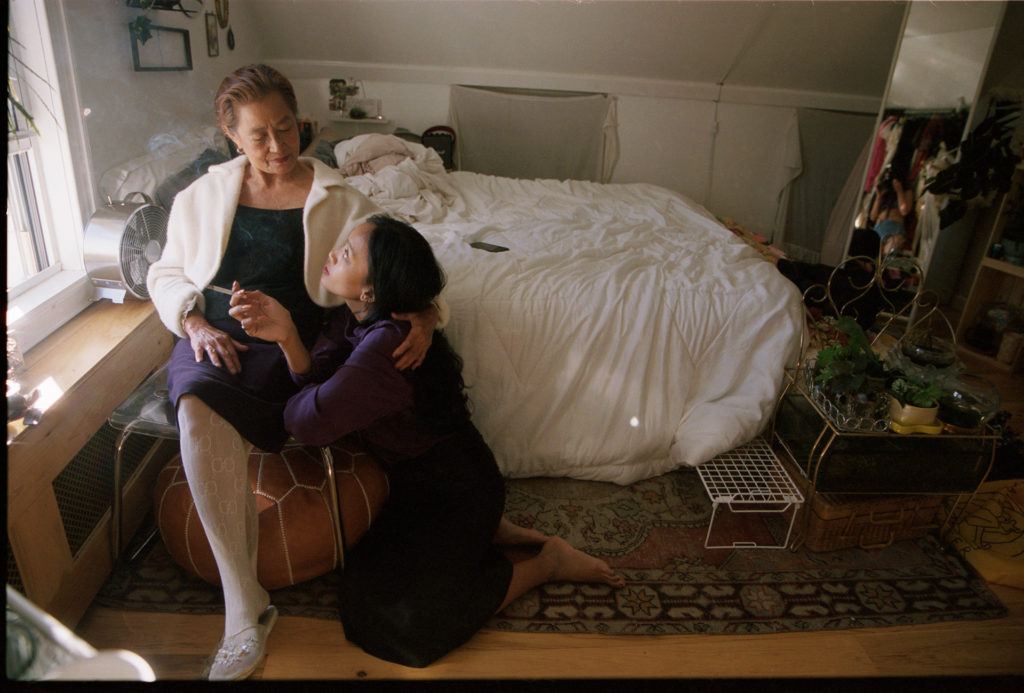
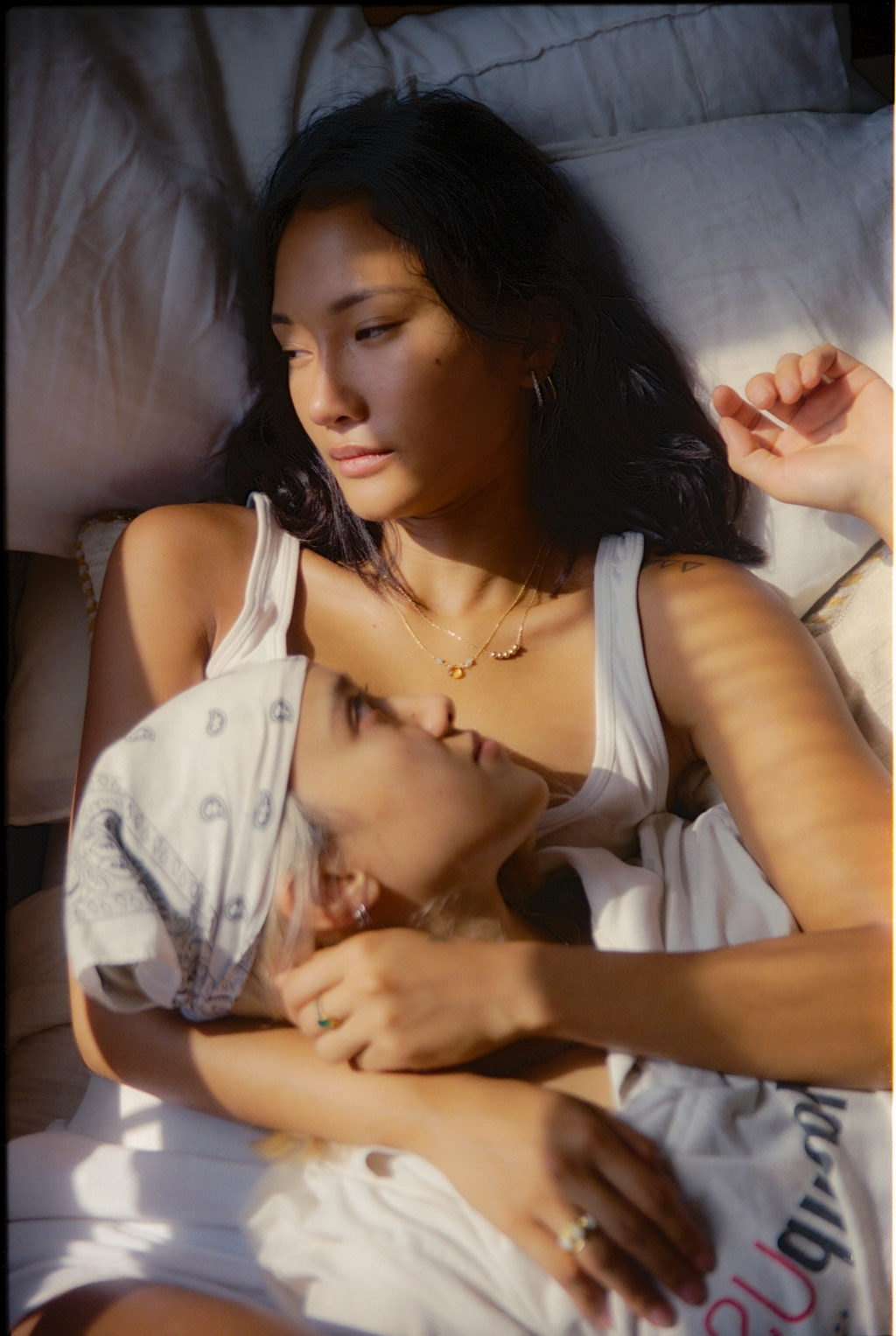
To allow yourself to be photographed is to open up to the world, to become the other–vulnerable to how the photographer and audience views you and how you see yourself in their eyes.
Photographer Ramona Wang explores how images interact with reality by creating sincere interactions within her work. For her, photography is used as a gesture of love. By carefully carrying the subject’s trust and vulnerability on her shoulders and into her lens, she creates collective sanctuary capturing herself alongside the model. Both photographer and subject are exposed. She asks, how do we care for each other while creating and viewing art?
In Family Album, Ramona stages intimate moments with some of New York’s most distinct faces, contrasting their often high-production commercial identity with portraits among their personal spaces and family members. She chooses to de-tokenize, demystify and contextualize the POC artist’s identity. She wants the viewer to question if and why the appearance of POC bodies must make artwork and imagery inherently political.
Below, FAR–NEAR interviews Ramona and her photographic companions on vulnerability, what they keep close and how they approach the familiar.
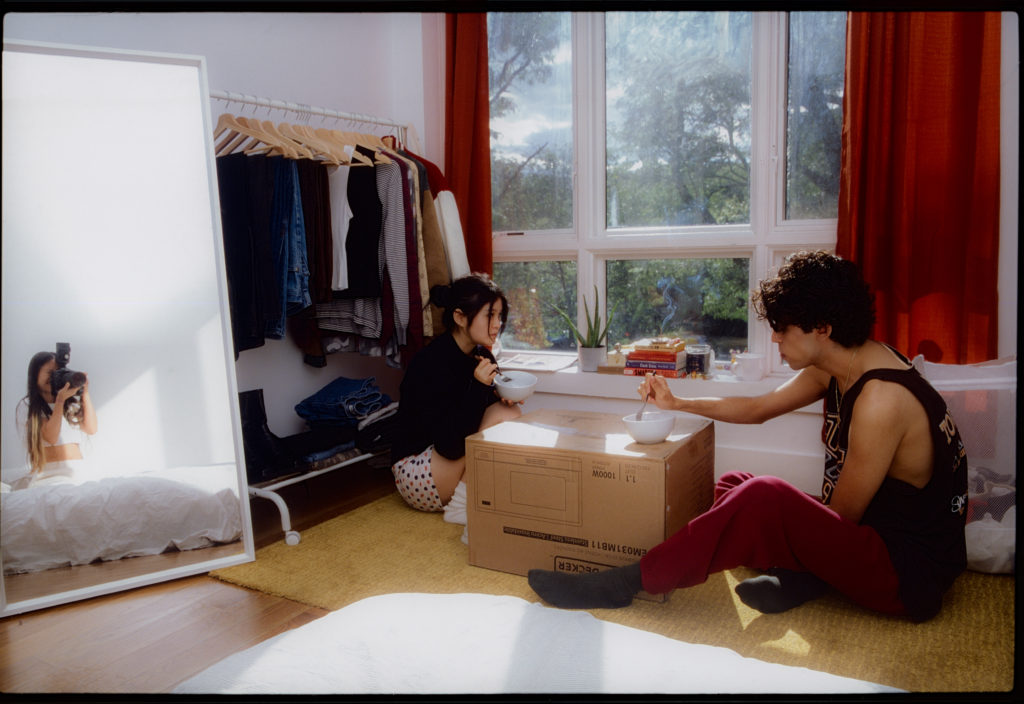
Sam and James
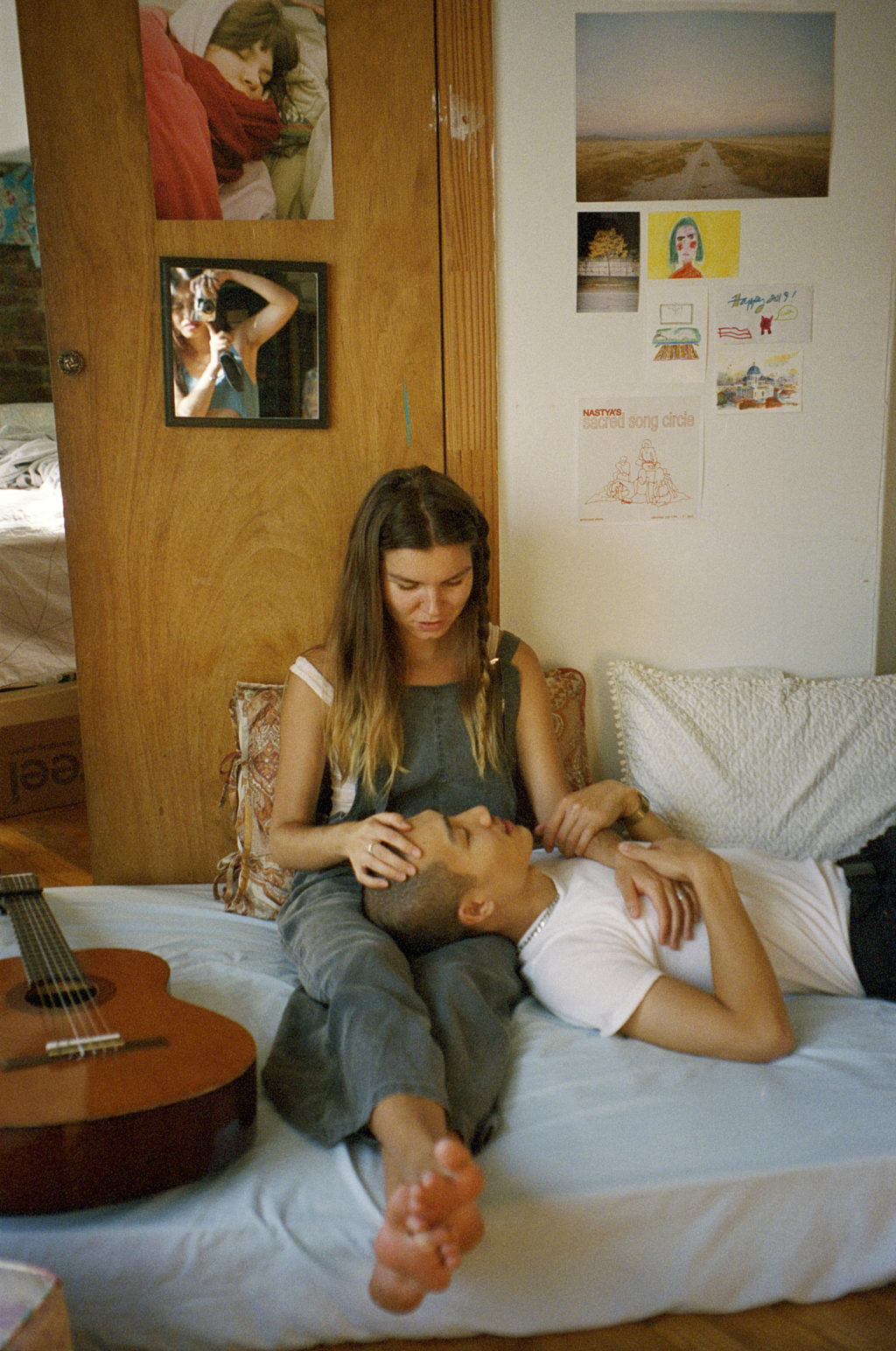
Kevin

Angelica and Cici
FAR–NEAR What do you keep close to you?
Ramona A jade Buddha necklace that my mom and I got from a temple when I was 5. We are not religious but we would always go to temples on holidays for fun and spend time there as a family. My mom told me jade has this magical power of protecting the person who wears it and it reminds me of her whenever I feel it on my chest.
Emily People who are kind, who I can trust and grow with, films and art that make me feel less alone, people who make me laugh, nostalgic memories, my phone even though I hate it, plants, a cold bottle of tea and a snack.
Angelica Cici… Haha, I keep all of the people I love close to me. Physically, if possible. But always mentally in the heart. It’s truly what keeps me going.
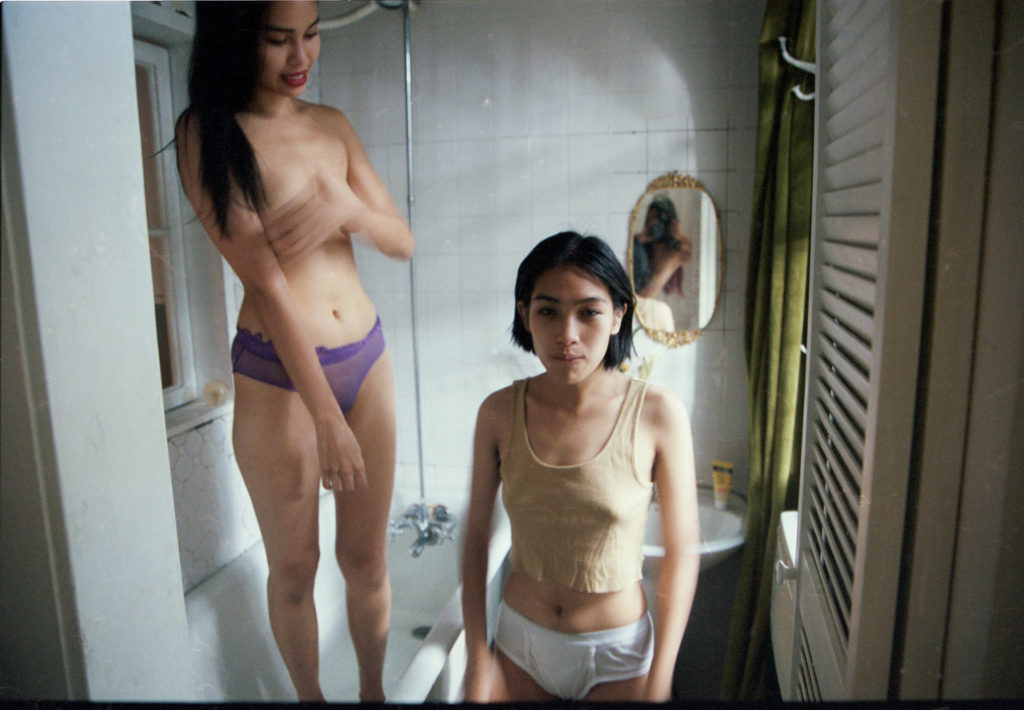
Hop and Chi
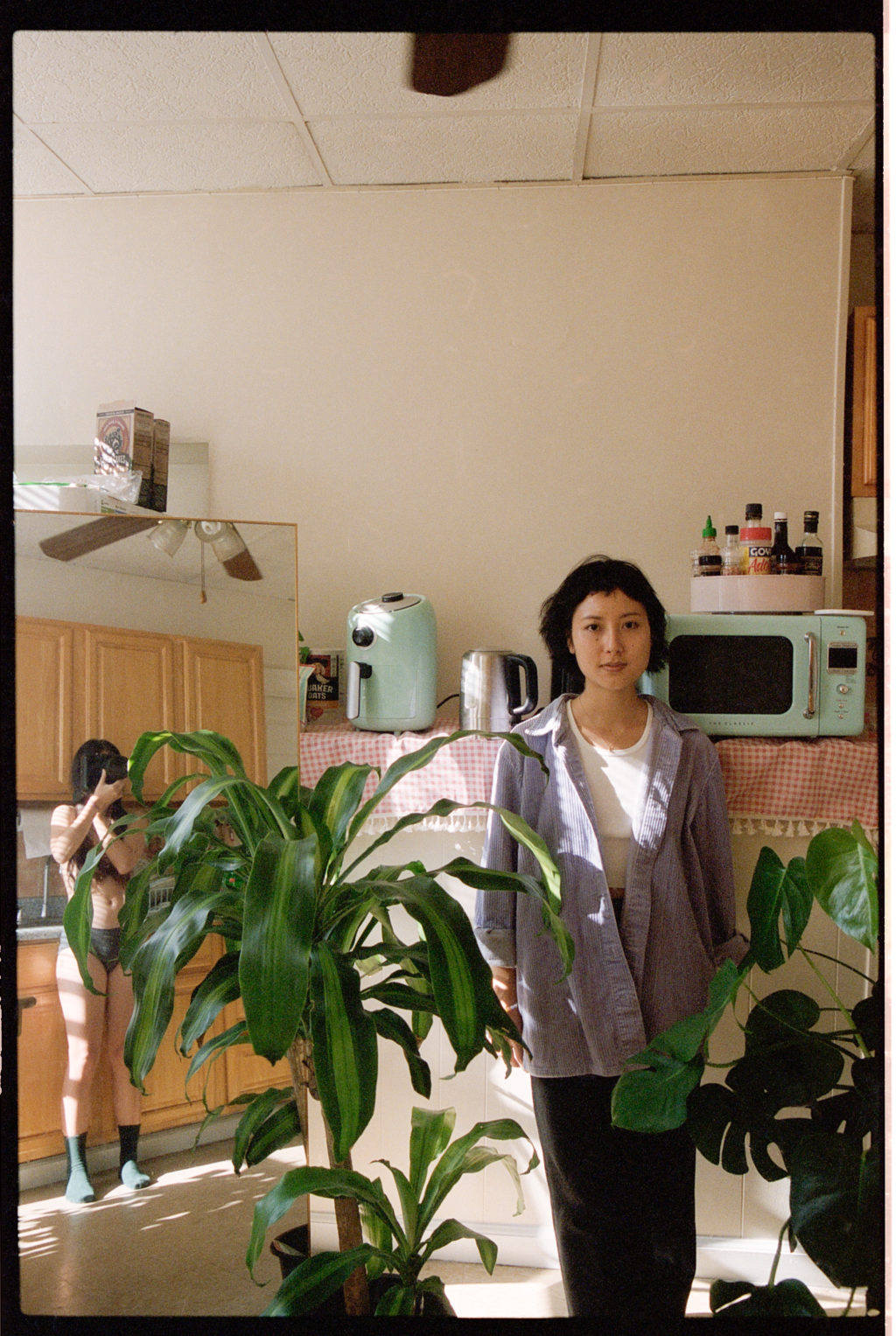
Emily at Home
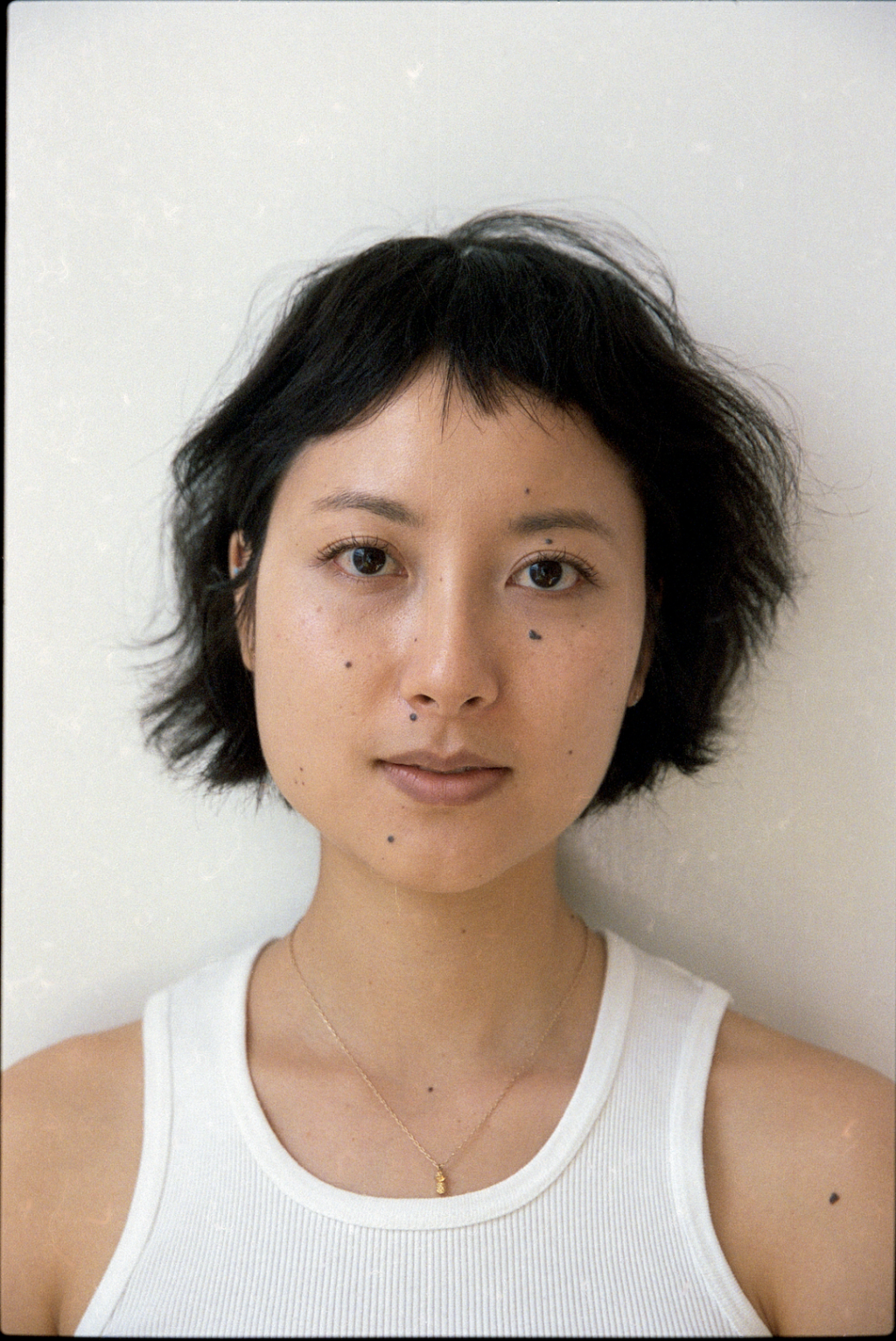
Emily May Jampel
FAR–NEAR Who is your family? How are they part of your life?
Ramona My parents and grandparents live in Guangzhou, China. I grew up with my parents and grandparents. When I was in kindergarten and elementary school, my grandma and grandpa would walk me to school in the morning and pick me up after school. I’d play badminton in the morning with my grandma before school. My dad cooks really good Sichuan food for us while my mom rarely goes into the kitchen. After I came to the U.S, my mom likes to send me random photos of her crochet bags that she makes when she’s bored.
Emily My immediate family lives on Oahu, where I was born and raised, and in Hong Kong where my mother was born. I usually see them once or twice a year and talk with them on the phone, but it’s difficult because of the time difference. My mom likes sending me emails and photos of clothing she tries on at the mall and my dad sends me Facebook messages with photos of his lunch, sunsets and dogs, usually without captions.
My grandparents on my mom’s side live in Hong Kong and own a store that makes children’s school uniforms. My grandfather is 93 and still goes to work every morning. He and my grandmother have been married for 60 years and eat at the same dim sum restaurant for lunch everyday. I haven’t seen them in years but my grandma always sends me handwritten cards on my birthday and printed photos of her and my grandfather all dressed up with their friends having fancy dinners together. They always look very classy.
Angelica My family is my parents, siblings, countless aunties, uncles, cousins, cousins, cousins. But it’s also anyone who I can emotionally relate with, be myself with, supports me and in the end who I would do anything for and vice versa.
Wenhao My mother, Mingxia. Her influence is different at different stages of my life. currently, in my early 20s, she is teaching me the most and feeling the most present. I talk to her about almost anything except for romantic relationships. I think its fine that she isn’t apart of every aspect of my life, I have friends that can support me in those spaces.
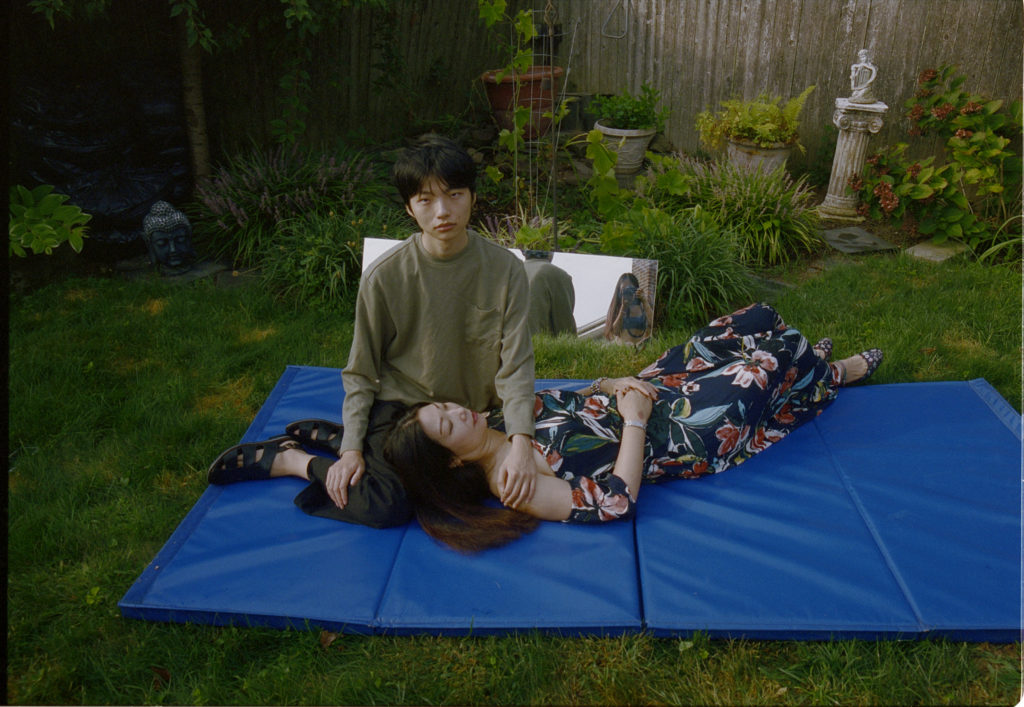
Wenhao and Mom
FAR–NEAR People often say coworkers, friends and such are “like family,” do you believe this? What does this mean to you?
Ramona I believe in the idea of a chosen family and I think family can be a group of people that I feel comfortable and connected with. Because I’m usually working as a model and photographer, most of the time my coworkers are people that I only meet a few times on set, and sometimes we end up being friends. Almost all of the Asian models that I photographed in this series are from other shoots that we did together. When I see another Asian person on set, I somehow feel the urge to try to connect with them.
Emily This might be cynical but my first thought is no. I feel like work relationships, at the end of the day, are fueled by money, so no matter how much you enjoy someone’s company within that structure, it still rests on the condition that this relationship is profitable and helps someone make money. But I guess you could argue that people might start off as coworkers and become genuine friends, or that money and transactional relationships also play a role in actual family relationships and even friendships too, so maybe it all just depends.
I think friends can definitely be like family. In many ways I feel more socially accepted and understood by my friends in the city than I do around my immediate family. There is something very special about the idea of a family that you can actively choose and create for yourself with people who you actually want to have in your life. I like the idea of choosing people to be in your family because you love them, rather than just loving someone because they happen to be in your family and you’re supposed to.
Angelica Absolutely. Family is any community that you can relate with, feel supported by, and makes you feel safe.
Kevin I think it’s easier to have a more genuine connection with people who grew up in the same generation and culture as us. Our biological families may be from a different generation and may have even grown up in a different country which can make it harder to connect with them. I think deep love and a strong bond are basic ingredients for referring to someone as your family outside of the biological context.
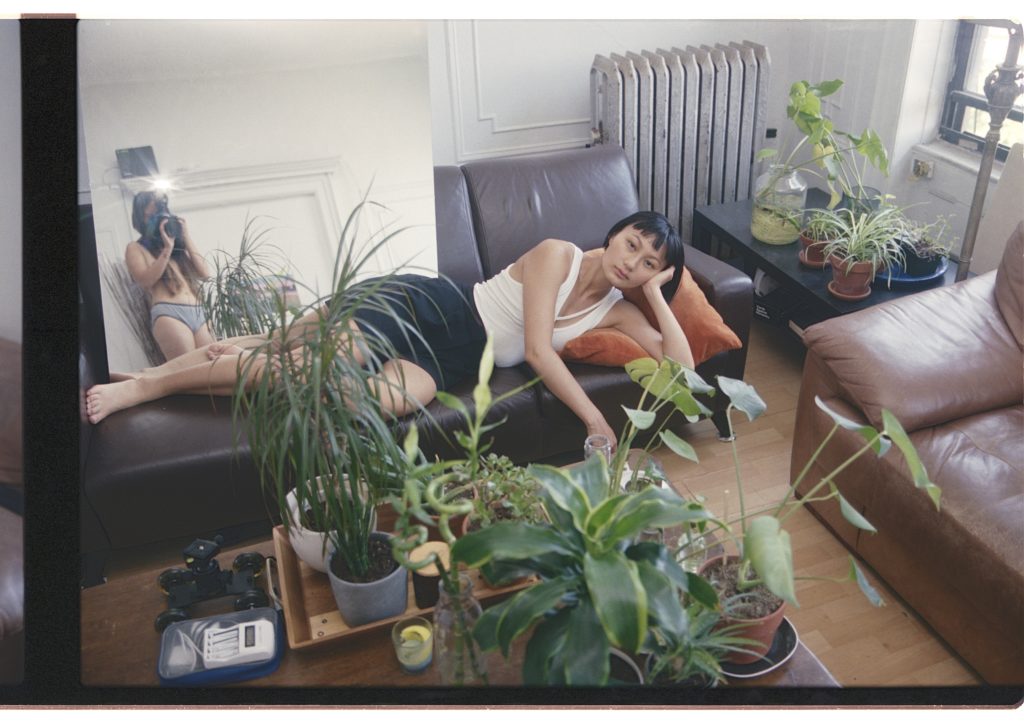
Eve
FAR–NEAR What does it mean to show you care? What is your caring language?
Ramona For me empathy and company are two big parts of showing care, and it should never be just a one time thing. I think caring requires constant and consistent thoughts, gestures and effort. I like to spend time with people I love even if we are doing nothing together. I try to be present whenever they need help and support.
Emily I think my caring language is a combination of emotional and practical. Thanks to my emotionally repressed Asian upbringing, I tend to be rather shy about expressing care very directly and verbally and am more comfortable showing it through nonverbal acts like helping someone with practical things… doing someone a favor, buying them dinner or giving gifts. But I’m trying to be better about showing care through language because I think it’s important. I feel very cared for whenever someone invites me over and cooks for me. There’s something that feels very warm and maternal that I really love.
Angelica I recognize care as doing what you can to make sure your loved one is happy and healthy. As an empath, I find my strong suit is being able to help through supportive words and an open heart.
Wenhao I feel most comfortable showing my care for those who have done the same for me. Caring for someone is changing and being fluid for them. Every person needs different things, so in order to care for them, I try to be receptive and look for what they specifically need.
Sam To me, showing you care is rooted in acts of kindness, words of affirmation, and quality time. I take that Five Love Languages quiz almost every month (haha), and those are usually my top three. The people I love will go out of their way to do small things to help me, tell me that everything is going to be ok, etc. So that’s shaped the way I care for others as well. I suppose my caring language is a combination of all three. I try my best to support those that I love by mirroring the care they give me.
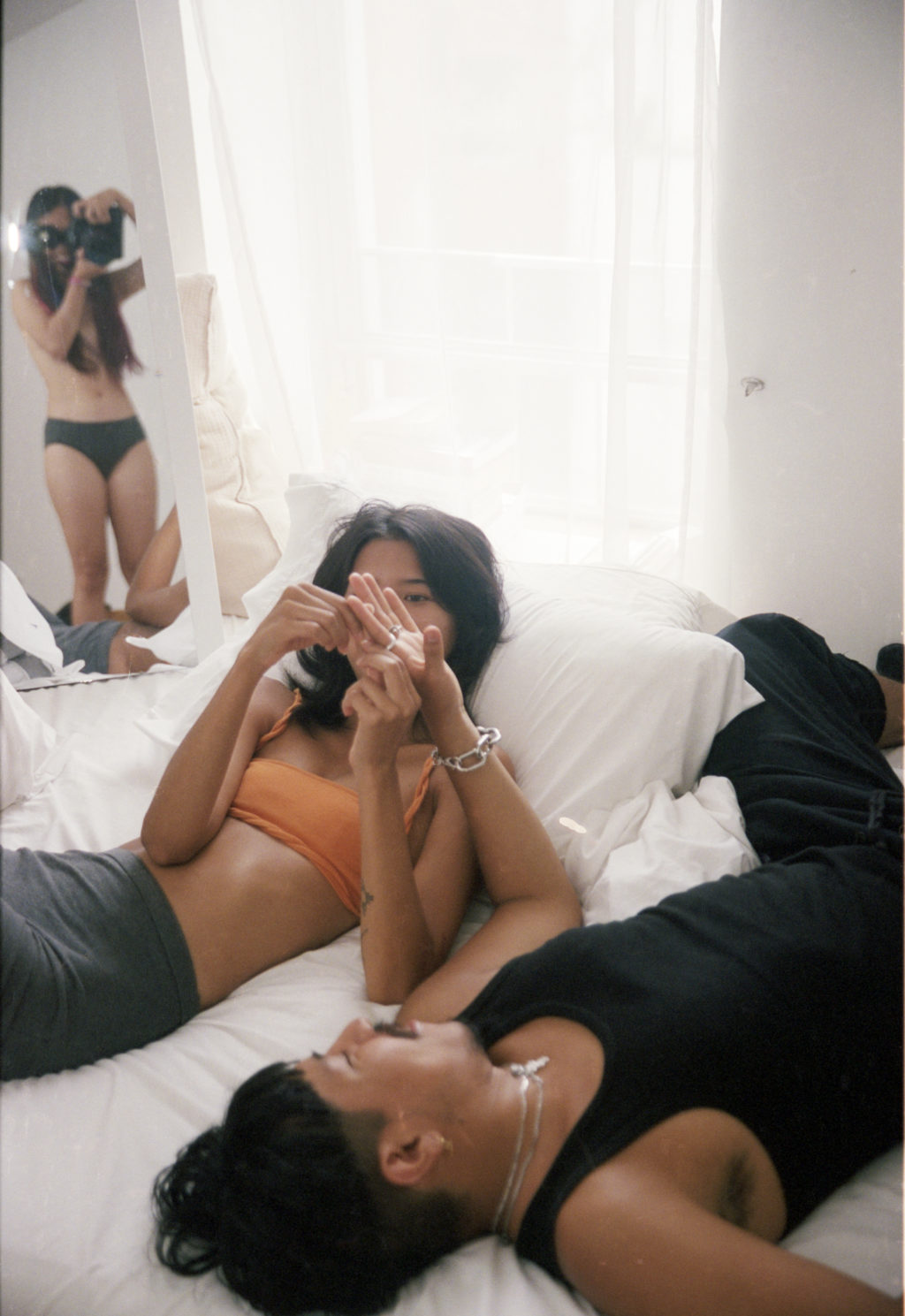
Michelle and Oscar
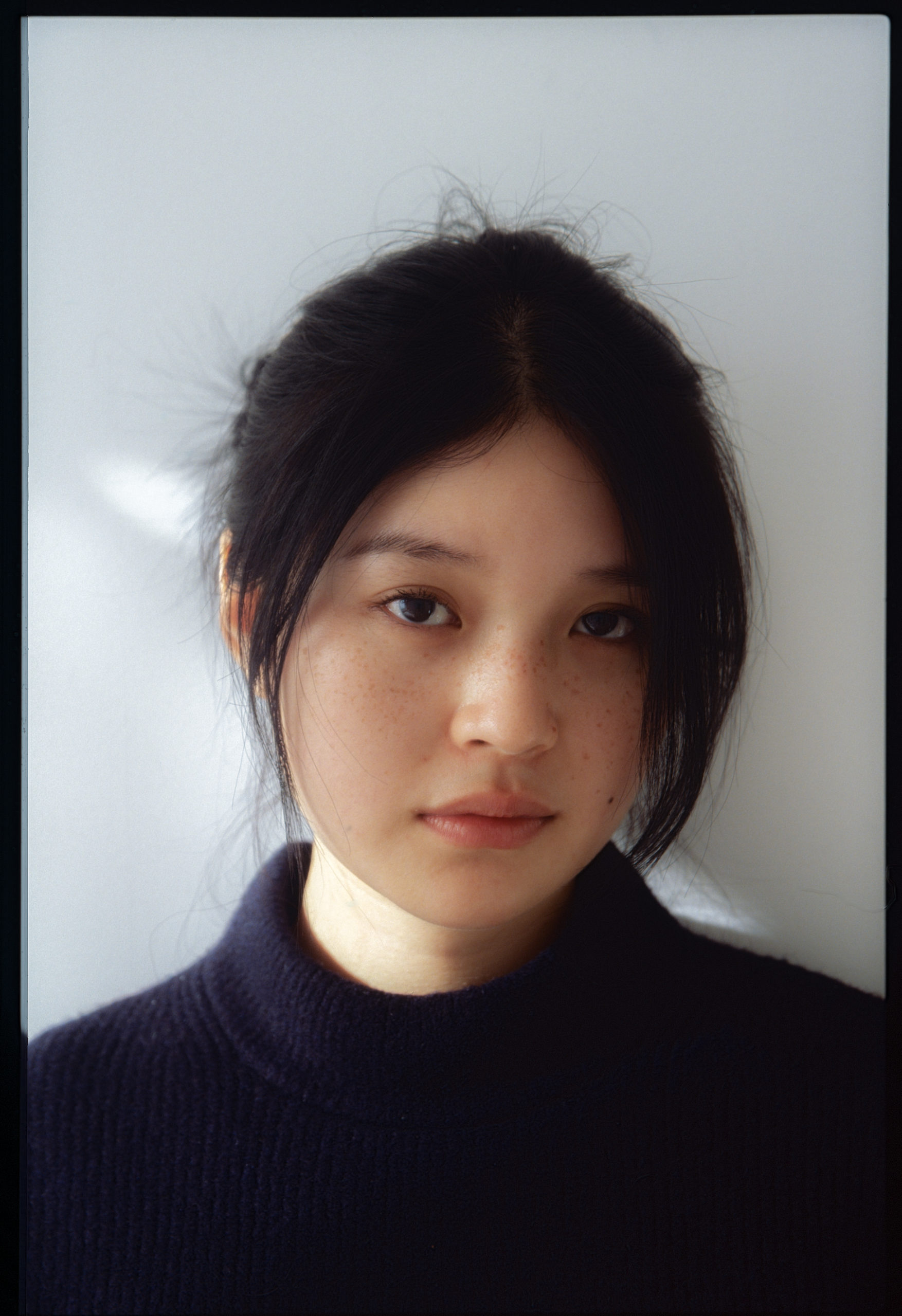
Sam
FAR–NEAR The word “familiar” derives from the word family. It is something that feels immediately intimate, recognizable or known to you. How do you think the art, fashion and cultural industries make Asian individuals and culture feel familiar? What do they make unfamiliar?
Ramona As an Asian living in the US for 8 years, I always have this subtle feeling of being in between things. I do not share a similar experience of growing up in the US with most Asian Americans and I’m comfortably identified with Chinese culture, but at the same time I have been living away from home for a long time. It is still surprising, confusing and shocking sometimes for me to see how certain Asian culture is represented in the western media in the current days. One of the most frequent feelings I have about Asian culture here is that people make Asian culture familiar by immediately simplifying it into a one dimensional merchandise, product, and brand. Such as Hello Kitty, bubble tea, kungfu, Wong Kar-Wai……I have also had experience on set where multiple asian models were cast as a single package – they were intentionally chosen for their similar looking “Asian” face feature and were placed into the scene almost like props. The nuances and individual stories about asian culture were something that became unfamiliar and unheard.
Emily I feel like there’s an interesting divide between certain Asian individuals and parts of Asian culture that are very familiar and well-loved, and others that don’t. Cultural products like Pokemon, Anime, Bubble Tea, Chinese takeout, Miyazaki films, Muji and Uniqlo, or shows like Terrace House, all feel like familiar and mainstream things that almost everyone knows, or grew up with. Despite that, I don’t feel like there is the same level of familiarity with or excitement around Asian individuals for most people.
Even though there’s a small handful of media figures like Sandra Oh, Ali Wong or Lucy Liu who people might recognize and feel a sense of familiarity with, I feel like the majority of Asian people still carry the impression of being very foreign and unfamiliar. I think a lot of cultural representation still paints Asian people as strange, mysterious, unemotional, silent or foreign and robotic. I feel like even the media that is trying to have more Asian representation either ignores their character or actor’s Asian-ness entirely, in attempt at making them more familiar to a mainstream audience, or reduces them to their ethnicity and Asianness, thereby making them feel one-dimensional and even harder to relate to on a deeper and more intimate level.
Even the ways a lot of Asian people are styled in fashion or photography I think contributes to these larger impressions of unfamiliarity. I’ve done multiple shoots where I’ve been stylized identically as at least one other Asian female in the shoot, I guess because of this kind of “twin aesthetic” that seems to be really popular, and while I can see the aesthetic appeal of it and believe it was probably unintentional, I also feel like that’s one example of the kind of imagery that can easily and subtly feed into this impression of Asian people all being identical and indistinguishable from one another.
Angelica When they recognize our stories and our hardships. When they include representation on screen and off screen. But when it’s an uneducated white person profiting off Asian culture, that’s not familiar.
Sam I think often times these industries make Asians feel “othered” and unrepresented. I regularly find myself feeling as if I’m navigating an unfamiliar space with not much representation or relation to my peers. However, I find a huge amount of comfort in the reality that there are Asian creatives and individuals that exist in these spaces (even if I’m not aware of them). When I get the opportunity to discover or build a connection with these people, that feeling of familiarity and warmth comes back.

Bea and Grandma.
FAR–NEAR Afterlife by Hiroyuki Koreeda is one of our favorite films. In it, individuals of all ages pass through limbo and are asked to choose one memory from their life to bring with them into the afterlife. Many choose quiet, intimate moments over the spectacular. If you could keep one memory what would yours be?
Ramona The memory of walking home with grandma from school everyday. When I was in elementary school, my grandma would come with a bag of snacks (chicken wings, eggs, buns……) waiting for me at the school gate everyday, and we would walk to the bus stop and take a bus home. It does not sound like anything dramatic and special, but the feeling that there’s always someone waiting and caring for me stayed in my heart. It was a memory that makes me feel less lonely when I’m alone.
Emily There’s this memory I have of the night I got to shoot with the photographer Ren Hang on a beach in California the summer after my sophomore year in college. I snuck out of the house where I was staying in the middle of the night and got into this old beat up car with a broken taillight with a bunch of beautiful Asian kids around my age who I had never met before with Ren in the front seat, and we drove down to the seaside while nostalgic Canto Pop played in the car speakers. All of us stripped down naked on the sand and climbed on these large cliffs and giant black rocks, laying on top of each other and contorting our bodies into strange shapes as Ren skipped around on the sand barefoot with his camera like an excited child with a new toy and took photos. The moon was really bright and the water was super cold but I honestly didn’t even care and felt like a wild animal in its natural state. I don’t think I’ve ever felt more alive and connected to nature or my body than I did that night. I just remember feeling so lucky and grateful for being Asian and exactly who I was at that moment in time. I don’t think I’ll ever experience that kind of magic ever again but I think about it all the time and want to keep chasing that feeling forever.
Angelica That’s… too hard. A compilation memory of me hugging everyone I love.
Kevin The taste of mango.
Sam When all of my family members would come over to celebrate my birthday. We’d play video games together, eat Burmese food, and laugh a lot.

